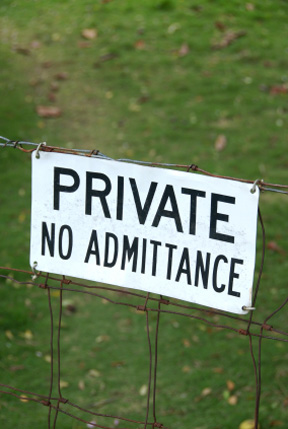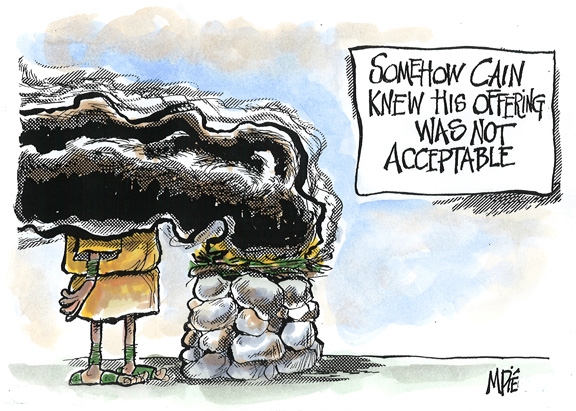I know there’s great concern in our world today about privacy and the possible lack thereof. Many are afraid that we are losing our privacy to the spying eyes of the Internet, represented most ominously by social networking sites like Facebook. I share this concern to an extent. But, I must confess that I also think we have too much privacy.
Before you fire off a nasty email or add a critical comment below, let me explain what I mean and don’t mean.
First, here’s what I don’t mean. I don’t mean that I think Facebook and related sites should have the freedom to access all sorts of personal information about us, our purchases, our families, etc. . . . without our permission. Nor do I think the government should be peering into our bedrooms, our checkbooks, or our medical records. So when I say we have too much privacy, I’m not referring to that which gets most of the buzz these days.
 Rather, I am considering privacy with respect to our personal relationships, especially relationships in the context of Christian community. Here is where I think most of us have too much privacy. Privacy enables us to keep our lives separate from others. It means we can hide our pains and struggles, our joys and victories. It means we’re alone in precisely those areas of life where we need other people.
Rather, I am considering privacy with respect to our personal relationships, especially relationships in the context of Christian community. Here is where I think most of us have too much privacy. Privacy enables us to keep our lives separate from others. It means we can hide our pains and struggles, our joys and victories. It means we’re alone in precisely those areas of life where we need other people.
The biblical picture of the Christian life stands in contrast to our privacy-obsessed way of living. As we saw in yesterday’s blog post, the New Testament envisions the Christian life as something that is to be shared. Christians are to “rejoice with those who rejoice” and “weep with those who weep” (Romans 12:15). Our sexual experiences, though done in private, nevertheless lie within the moral purview of the Christian community. How we parent our children is not our personal business, but something for which we are to be accountable to our Christian community. And when we mess up in our personal lives, we are to confess our sins to each other (James 5:16).
I believe that most Christians have way too much privacy in their lives, privacy that keeps them disconnected from the encouragement, prayers, counsel, and accountability of Christian fellowship. During my years as a parish pastor, I listened as hundreds of people shared with me their moral failings. In almost every single instance, these failings were done in secret. A man on a business trip gets snared into watching porn on the hotel television because nobody will know. A woman visits a computer chat room and ends up falling in love with someone she’s never even met because she could do secretly. A teenager sneaks out of the house so we can smoke marijuana. [Oops. Now that’s what I call a typo, caught by my wife. I meant “he” not “we.” Yikes!] A business owner breaks the law because he thinks he’ll never be caught. And on, and on, and on it goes.
I believe individual Christians and also Christian communities would be much healthier if there was more sharing of life and less privacy. Now, let me be clear. I am not saying that you should broadcast your sins to your whole church. Nor am I inviting the church busybodies – and most churches have plenty of these – to satisfy their curiosity by eavesdropping on your life so they can blab about it around the church. Rather, I am suggesting that every Christian needs some safe place where he or she can share with trusted brothers or sisters the real stuff of life: pains, fears, dreams, fantasies, temptations, failures, losses, financial choices, etc.
I have been part of such safe places and have personally benefited from them. I have seen vulnerable sharing of “private” matters lead to transformation and healing people’s lives. For example, I have seen a man share with a couple of brothers his sexual attraction to a woman who was not his wife, thereby finding support and accountability, not only to shun adultery, but also to strengthen his marriage. I have seen a woman share some of her deepest dreams with a small group, finding support and encouragement to follow those dreams in a way she never would have been able to do if she had kept them to herself.
To be sure, sharing yourself with others is risky. You are being truly vulnerable, a word that comes from the Latin meaning “able to be wounded.” I have seen people risk opening their lives to others, only to be hurt by their judgmentalism or failure to hold things in confidence. In my pastoral life, more than once I opened my heart to someone, only to be kicked in the gut. So, believe me, I am not idealizing Christian community. Genuine community is not easy. Truly sharing your life with others is not easy. But it is an essential component of health and growth in our personal lives and in our communities.
To sum up, as I hear so much talk these days about privacy, I keep wondering if some of us might be better off deciding to share our lives more openly with a few trusted Christians rather than fretting about our potential loss of privacy over the Internet. Of course one could decide to have strong privacy settings on Facebook and be more open in a small group. That would be just fine. But, as a Christian and a pastor, I continue to think that our desire for privacy often does more harm than good . . . to us, our families, and our Christian communities.

